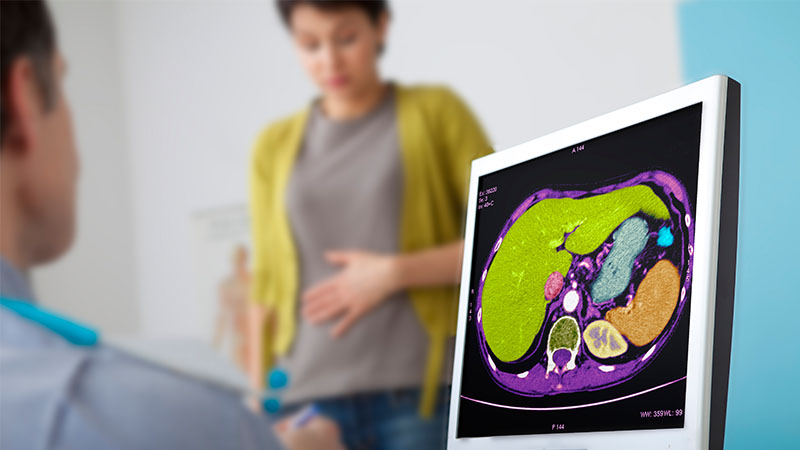
Northwestern Medicine Endoscopy Services
Northwestern Medicine specialists provide advanced endoscopy services to promote better digestive and respiratory health.
Why choose Northwestern Medicine for endoscopy services?
Endoscopy procedures help you maintain digestive and respiratory health. The talented and compassionate Northwestern Medicine endoscopy teams1 strive to provide an excellent experience for you during your procedure. You have access to:
- Board-certified gastroenterology and pulmonary physicians, along with specially trained nurses and technicians
- A clinical support staff skilled in the latest endoscopy procedures—and at keeping you relaxed to minimize your discomfort
- Spacious suites that feature leading-edge endoscopic technology
- Individual preparation and recovery bays for comfort and privacy
Endoscopy procedures
During an endoscopy procedure, a thin, lighted tube—called an endoscope—is inserted into your body either through your mouth or your rectum. A camera at the end of this tube transmits images, allowing the physician to clearly view the desired area in your digestive or respiratory tract. If needed, tiny instruments can be passed through this tube to remove a small sample of tissue for biopsy or to treat any abnormal areas.
Endoscopic procedures may be performed for the following purposes:
- Diagnostic: To help identify and analyze medical conditions
- Screening: To help prevent diseases, such as colon cancer
- Therapeutic: To treat a disease or remove abnormal tissues
Types of endoscopy procedures
Your physician may order a specific endoscopy procedure for you in response to your symptoms, such as difficulty swallowing, breathing problems, nausea or abdominal pain. Colonoscopies are typically performed as a preventive screening for polyps that could lead to colon cancer.
Northwestern Medicine offers a range of specialized endoscopic procedures and treatments, each focusing on a specific organ or area in your body, including:
- Upper gastrointestinal (GI) endoscopy (esophagogastroduodenoscopy): This diagnostic procedure allows your physician to diagnose and treat problems in the upper gastrointestinal tract. The endoscope is guided through your mouth and throat, then through your esophagus, stomach and duodenum (first part of the small intestine) to examine the inside of these organs and detect abnormalities.
- Lower gastrointestinal (GI) endoscopy: This diagnostic procedure allows your physician to examine the entire length of your large intestine and rectum for possible concerns, such as inflamed tissue, ulcers, bleeding and polyps that may lead to cancer.
- Bronchoscopy: This diagnostic procedure allows your physician to examine the inside of the trachea (windpipe) and bronchi (large airways leading into the lungs). Samples of tissue may be removed through the bronchoscope for examination under a microscope in the laboratory.
- Endoscopic retrograde cholangiopancreatography (ERCP): This procedure allows your physician to diagnose and treat problems in the liver, gallbladder, bile ducts and pancreas. The procedure combines X-ray and the use of an endoscope, a long, flexible, lighted tube. Your physician can examine the inside of these organs and detect any abnormalities.
- Sigmoidoscopy: This diagnostic procedure allows your physician to examine the inside of a portion of the large intestine, and is helpful in identifying the causes of diarrhea, abdominal pain, constipation, abnormal growths and bleeding.
- Capsule endoscopy: This diagnostic procedure allows your physician to examine the small intestine to identify causes of bleeding, detecting polyps, inflammatory bowel disease, ulcers and tumors of the small intestine. A PillCam (a tiny camera contained in a capsule) is swallowed and passes through the digestive tract while transmitting video images to a data recorder.
Research
The research activities of the Northwestern University Feinberg School of Medicine Division of Gastroenterology and Hepatology reflect the diversity of faculty interests and clinical areas of expertise, as well as continue to transform the field of gastroenterology. Current ongoing research in endoscopy includes:
- Investigation of GERD symptoms in patients with Barrett esophagus undergoing RFA
- Long-term outcomes of patients undergoing endoscopic therapies for Barrett esophagus
- Impact of ERCP with cholangioscopic tissue acquisition in benign and malignant biliary strictures
- Biopsy techniques for gastric submucosal masses e.g., GIST
- Optimization of difficult biliary cannulation techniques
- Use of balloon enteroscopy for previous incomplete (difficult) colonoscopies
- Interventional endoscopy
For more information about research in interventional endoscopy, visit the Division of Gastroenterology and Hematology Endoscopy Research page.
Conditions
Locations & Contact Information
Related Resources
- U.S. National Library of Health: Colonoscopy
- U.S. National Library of Health: Endoscopy
In the spirit of keeping you well-informed, some of the physician(s) and/or individual(s) identified are neither agents nor employees of Northwestern Memorial HealthCare or any of its affiliate organizations. They have selected our facilities as places where they want to treat and care for their private patients.


